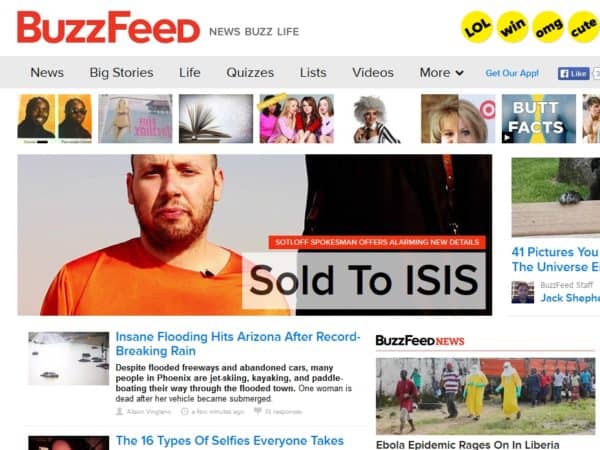
“Frankly, your investment leaves me bewildered”.
An open letter from Monday Note’s Frederic Filloux to Andreessen Horowitz’s Ben Horowitz penned over the weekend was aghast at the esteemed VC firm’s $50-million dollar investment into BuzzFeed that reportedly valued the notorious clickbait site at $850-million.
Filloux, a seasoned journalist who has worked in New York and France covering digital media and technology, reserves praise for Horowitz, noting the “courage” and “focus” exhibited by his blog and his “remarkable” book. He then took the investor to task for an investment he clearly finds repulsive.
BuzzFeed is to journalism what Geraldo is to Walter Cronkite. It sucks.
“Obviously, you know more than I do about BuzzFeed’s long term’s prospects: Impressive growth, heavy reliance to technology,” says Filloux. “From a pure business perspective tough, I would be very careful to put other people’s money in a traffic-machine that depends for 75% on social referrals because not all clicks are born equal. BF’s are myriad, but they are worth a tiny fraction of, say, a click on The New York Times. I spent some time trying to overcome my reluctance to BuzzFeed’s editorial content. I wanted to to convince myself that I might be wrong, that BuzzFeed could in fact embody some version of journalism’s future. But if that’s the case, I will quickly resettle in a remote place of New Mexico or Provence. BuzzFeed is to journalism what Geraldo is to Walter Cronkite. It sucks.”
BuzzFeed, which was founded in 2006 by Jonah Peretti, has simultaneously grown into one of the most popular and reviled sites on the web. It made headlines earlier this year when writer Benny Johnson was found to have plagiarized other work more than forty separate articles he claimed as his own. But it was not the first time BuzzFeed had faced these type of charges. A 2012 article in Gawker by Adrian Chen tackled the dubious inspiration of the sites popular lists. “BuzzFeed’s popular lists are often not original flashes of viral genius. Many are highly derivative rip-offs from other sites, cleaned up and reproduced without crediting their sources,” noted Chen.
In another move that without doubt had some scrambling for the modern definition of the term “meta”, longtime parody site The Onion created another parody site called Clickhole to mock clickbait sites like BuzzFeed. Current headlines there include “This Woman Tried to Put Chapstick on a Cat and It’s Definitely Not Going Viral”, and “America’s Worst Generation: Only One Of My Three Nephews Knows Who Ace Frehley Is”.
Is a critique of BuzzFeed’s journalistic practices a valid dismissal of the site as a business? Investing, after all, is not about “journalism’s future”, but about making money.
Jokes aside, Filloux is by no means alone in taking BuzzFeed and its business practices to the intellectual woodshed. In a long rant against native advertising recently, HBO’s John Oliver singled out criticism for the site on his program “Last Week Tonight With John Oliver”.
“His face is like BuzzFeed itself,” said Oliver of BuzzFeed CEO Jonah Peretti. “Successful. Appealing. And yet somehow, you want to punch it.”
But is a critique of BuzzFeed’s journalistic practices a valid dismissal of the site as a business? Investing, after all, is not about “journalism’s future” but about making money. Matthew Turlip, Senior Financial Analyst with Privco says comparing BuzzFeed to old media assets is wrong-headed.
“You’re better off comparing it to a company like Yahoo, which is currently trading at about seven and a half times its trailing twelve month or 2013 revenue,” said Turlip on a recent appearance on BNN. “If you look at BuzzFeed, at an $850-million valuation is about seven times its 2014 projected revenue of $120-million.”
A seven-times multiple, of course, might be considered pricy if we were merely talking earnings, not revenue, but Turlip argues BuzzFeed has seen significant growth in a short period of time, noting that its previous round, done in January of 2013, valued the company at just $200-million.
For better or worse, BuzzFeed is wildly popular and becoming more so. The site now boasts nearly five times the monthly unique viewers as the Wall Street Journal. Of courses, stories like “The 16 Types Of Selfies Everyone Takes”, aren’t going to win any Pulitizers, but BuzzFeed is far ahead of its competitors is terms of deploying effective, industry friendly native advertising. Future of journalism? No. A potentially lucrative investment? The jury is still out.
Leave a Reply
You must be logged in to post a comment.


 Share
Share Tweet
Tweet Share
Share




Comment